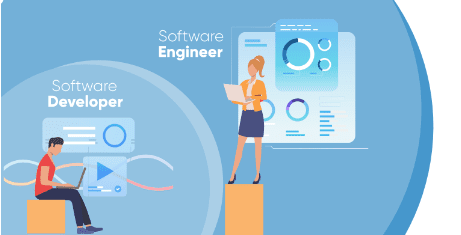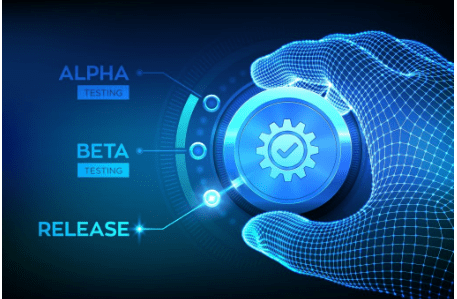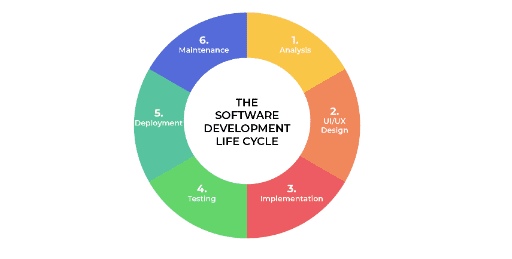It’s quite normal to be unclear about the distinction between the two titles of software developer vs software engineer; since the speed of digitization is still on the rise, many people are still unclear about these 2 career concepts.
Simply put, software developers and software engineers are distinct entities, with different duties and responsibilities to serve the different development goals of software development. And there is also disagreement between experts as to whether or not the titles are meaningful. So what is the difference between software engineer vs software developer? Check this post out!
Software Engineer vs Software Developer
These two titles have certain characteristics since they both perform the same function: addressing software-related duties. However, if you like collaborating with others and thinking outside the box, a career as a software developer might be a good fit for you. Conversely, software engineering may be a right match if you like applying a broad spectrum of technical concepts.
| Software Engineer | Software Developer |
| To design, build, maintain, test, and evaluate computer software, one must be a software engineer.
When solving problems, engineers often think quite broadly. They need to be more methodical in their approach and thinking, since there is less possibility for innovative ideas. List of critical software engineer skills:
|
Coding is done from scratch by software developers. Moreover, they design programs that are compatible with a wide range of computing platforms. It might be a mobile app that can be used widely even on wearable devices or any other web-based service.
It’s common for developers to do all of an Engineer’s duties, but on a smaller scale. As a result, they are able to problem solve with more ingenuity than any engineer. List of critical software development skills:
|
Development of Software: What Is It?
To put it simply, software development is the process through which software applications are created. The Software Development Life Cycle (SDLC) describes a series of steps that may be followed to create a product that satisfies both technical aspects and the needs of end users.
Businesses in the software industry now have access to a globally accepted standard thanks to the Software Development Life Cycle (SDLC). It provides a set framework that teams may follow to produce and maintain reliable software. The goal of every IT software project should be to provide high-quality goods within a specified time frame and financial constraint.
Steps of SDLC
At Groove Technology Software – best outsourcing company in Australia, there are several steps that must be completed before a finished software program is released, and they are all outlined in the Software Development Life Cycle. For software solutions to be delivered quickly and efficiently, each step correlates to a function or duty that participants must learn, execute, and perfect. These phases of production consist of:
- Collecting Needs Statements: At this point in the process, the team has identified and defined the existing issues, needs, suggestions, and market expectations about the software application.
- Design of Software: During this stage of development, the team deliberates over and settles on the software design’s final architecture and build. Design documentation, coding rules, and discussions about runtimes and frameworks may all be part of this process.
- Creation of New Software: As a result of the design choices taken in the previous step, teams may now begin constructing the actual software solutions. Team members here apply the approach to the issues identified in the software requirements collecting phase and achieve the results desired by the project’s stakeholders. This is considered to be the most time-consuming and most technically demanding stage of the entire process.
- Verification and Combination Testing: The solutions put in place must be tested, or quality assured, to make sure they function as expected. This may include testing the program at the unit level, executing integration and end-to-end tests, verifying and validating the solution, and reporting or identifying any issues that were found.
- Software Deployment: Users and clients of the custom software development service benefit from the research, planning, development, and testing that went into it. Delivering updates to a client requires creating a software deployment strategy and providing infrastructure.
- Upkeep and Operation: At this point in the process, the software is made operational to check for and fix any deployment-related problems. This phase of the process may entail investigating, comprehending, and tracking live application service performance. It may entail handling incidents that arise as a result of fixing bugs or making other modifications that impact users.
2 Titles Key Difference
A software engineer is responsible for all the same things as a developer, but from an unique perspective. In contrast to a software developer, who specializes in creating and maintaining software for a certain computer platform, a software engineer applies software engineering principles to the process of creating, modifying, deploying, and assessing software.
While the phrase Software Developer refers more narrowly to the process of creating software, the term Software Engineer encompasses all aspects of software engineering, from initial concept through ongoing updates and fixes.
Software engineers may benefit from the following best practices:
- The actions of a software engineer should be mutually advantageous for the company and the client.
- Make sure any updates or additions to your program are up to snuff professionally.
- Having strong personal ethics and sound judgment is essential for software engineers who want to do their best job.
- Able to advocate for a morally sound method of creating and maintaining software.
- Engineers in the software industry should always have one other’s backs.
Some recommended procedures for software developers:
- Be aware of how your code affects the big picture.
- Integrate the code into your project properly.
- Plan out your coding tasks for the day.
- Make a strategy for how you’ll tackle the coding project at hand
- It’s best to tackle the toughest element of your task first.





































